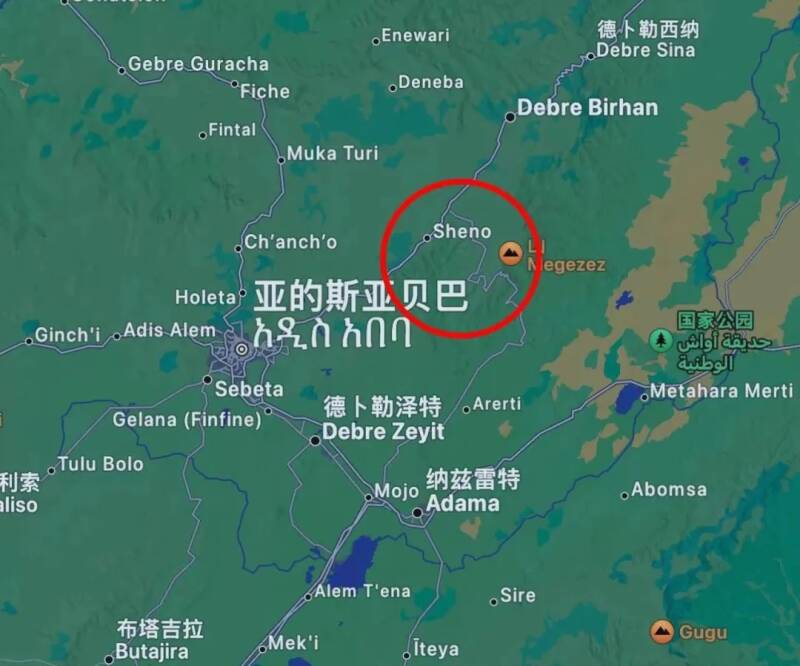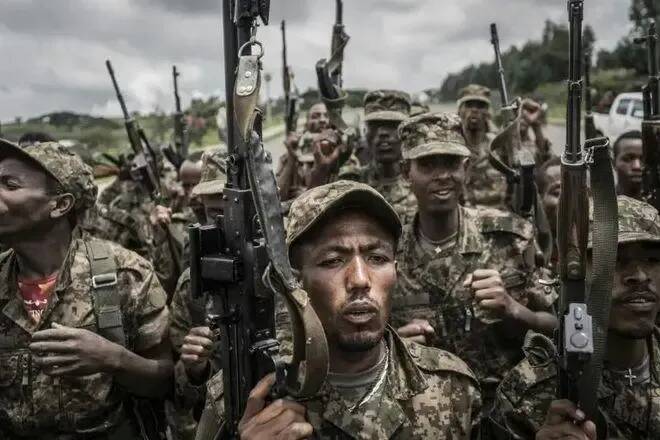Distance 55 kilometers! War is closing in on the Ethiopian capital
According to local media reports in Ethiopia, fierce fighting broke out between the Fano forces and the Grand coalition government forces formed by the Ethiopian National Defense Force and the militia. And the fighting took place only 55 kilometers from the country's capital, Addis Ababa.
The war in Amhara has been going on for nearly a year since the Ethiopian government declared a state of emergency, and it shows no sign of abating, but is getting worse, with a worrying level of security, causing civilian casualties and other losses.

And, according to reports, the fighting between Fano's forces and the Politics and Law Army began on July 12th, in the town of Kormash town in the Minjar district (Minjar district). According to the deputy director of public relations of the Fano Shao command, they fought with the joint government departments, but the joint government forces shelled towns indiscriminately, so the Fano forces retreated to avoid civilian casualties.
In addition, in the Gondar city area city area of Amhara, there has been fierce fighting in recent days, and there are reports that Farno forces are close to the airport that controls the city. And the guerrilla tactics of Fano's forces in the area have caused obvious damage to the government forces.

Although the federal government has tried to use local militias and riot forces against Fano forces, it has been to no avail, and there are reports that more and more riot forces and militias have defected and joined Fano forces.
The federal government and the National Defense Forces have long claimed to have defeated "extremist forces" in the Amhara region. However, according to local media reports, even if the government forces launched a large-scale offensive in these areas, but did not achieve the desired results, but Fano forces caused a serious blow to the government.
As a result, there are reports that the government leadership in Amhara is changing its position that the war can no longer be sustained. All because of the current suspension of millions of students in Amhara, some medical facilities have been seriously affected, resulting in serious economic losses and civilian casualties in the region.
Under the current situation, civil war may break out again in the future, which will seriously affect the country's economy. Once the civil war breaks out, it may cause losses to the country's infrastructure, production capacity and supply chain, and restrict production and business activities. Including coffee, tourism and other industries have been damaged.
For the coffee industry, which is one of Ethiopia's important industries, coffee accounts for 30% of the country's export earnings, accounting for 35% of the country's export earnings, so the government needs to earn foreign exchange through coffee exports in order to buy weapons, which may increase coffee exports. But the outbreak of civil war may damage some infrastructure or road facilities, and the war may spread to some coffee producing areas, resulting in reduced production and quality. In addition, the civil war broke out, local kidnappings and other incidents often occurred, the security situation is grim, coffee traders reduced the number of local coffee traders, also hindered the development of Ethiopian coffee industry.
In addition, the current export is also a major problem, all due to the Red Sea crisis, Ethiopia's only export port of Djibouti has been blocked. Earlier, MSC, which is responsible for 80 per cent of the port's imports and exports, announced the suspension of Djibouti port operations, which will seriously affect Ethiopia's coffee supply.
Important Notice :
前街咖啡 FrontStreet Coffee has moved to new addredd:
FrontStreet Coffee Address: 315,Donghua East Road,GuangZhou
Tel:020 38364473
- Prev

Introduction to Lake Kivu, a coffee producing area in Rwanda, Africa
African coffee has a very high reputation in the global coffee market, because the African country Ethiopia is recognized as the birthplace of coffee. In addition, there are many outstanding coffee-producing countries, such as Rwanda, known as the "Land of Thousands of Hills." German missionaries introduced coffee to Rwanda in 1904, and in 1930
- Next

What should I do if the filtration speed of cold extract coffee is slow? What efficient cold extraction filtration techniques are there?
Cold extraction is refreshing for a while, but filtering takes half a day. If you like to make your own cold extract coffee, have you ever encountered this kind of trouble: I wanted to make it convenient, but I made it last night and drank it today. However, during the process of separating the dregs, the coffee liquid flowed slower and slower. Ten minutes have passed. This pot of cold extract has not even finished dripping. No need to guess, the filter paper must be blocked by fine powder again.
Related
- What grade does Jamaica Blue Mountain No. 1 coffee belong to and how to drink it better? What is the highest grade of Blue Mountain coffee for coffee aristocrats?
- What are the flavor characteristics of the world-famous coffee Blue Mountain No. 1 Golden Mantelin? What are the characteristics of deep-roasted bitter coffee?
- Can I make coffee a second time in an Italian hand-brewed mocha pot? Why can't coffee be brewed several times like tea leaves?
- Hand-brewed coffee flows with a knife and a tornado. How to brew it? What is the proportion of grinding water and water temperature divided into?
- What is the difference between Indonesian Sumatra Mantinin coffee and gold Mantinin? How to distinguish between real and fake golden Mantelin coffee?
- What does bypass mean in coffee? Why can hand-brewed coffee and water make it better?
- Unexpected! Ruixing Telunsu lattes use a smoothie machine to foam milk?!
- % Arabia's first store in Henan opens into the village?! Netizen: Thought it was P's
- Does an authentic standard mocha coffee recipe use chocolate sauce or powder? Mocha Latte/Dirty Coffee/Salty Mocha Coffee Recipe Share!
- What is the difference between Vietnam egg coffee and Norway egg coffee? Hand-brewed single product coffee filter paper filter cloth filter flat solution!

